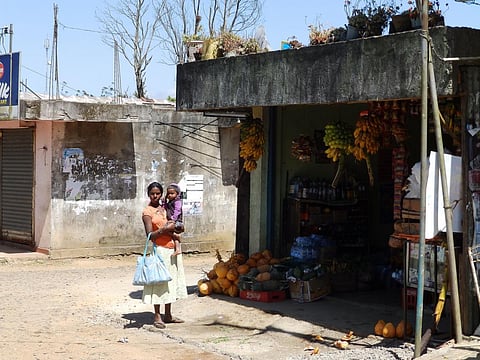

Production of paddy, Sri Lanka’s main staple, is projected to be the lowest since the 2017 drought, according to the Food and Agriculture Organization (FAO) of the United Nations. This, along with poor harvest of vegetables, fruits, grains and cattle feed will intensify food insecurity in the country, the organisation warned.
Harvest has already been poor for two consecutive seasons, FAO and the World Food Programme noted in a joint report released September 12, 2022. Sri Lanka has been in the grip of a political turmoil that culminated in the resignation of Prime Minister Mahinda Rajapaksa. Several economic indicators dipped to dangerous levels amid the crisis that followed the COVID-19 pandemic headwinds.
Reduced imports of food grains due to foreign exchange constraints will exacerbate the crisis of the 6.3 million people already facing moderate to acute food insecurity, the agencies noted in the Crop and Food Security Assessment Mission (CFSAM) report.
Abdur Rahim Siddiqui, WFP representative and country director in Sri Lanka, said:
More than 60 per cent of families are eating less, and eating cheaper, less nutritious food. This comes at a time when financial constraints have forced the government to scale back on nutrition programmes, such as school meals and fortified food to mothers and undernourished children.
The volume of cereals imported in the first six months of 2022 was only 42.2 per cent of the import required for the entire year.
Year-on-year food inflation rate was nearly 94 per cent in August 2022, as food prices rose steadily since the last quarter of 202, according to the report.
The experts suggested that vulnerable and marginalised population groups be given immediate food or cash-based assistance. These include pregnant and breastfeeding women, women-headed households and persons with disabilities.
The other solutions included:
The joint Crop and Food Security Assessment Mission visited all 25 districts in the country in June and July 2022 to analyse agricultural production levels in 2022, the press statement by the UN agencies noted. The team assessed the production of main staple cereals as well as household food security conditions.
One of the main reasons behind the poor harvest was reduced application of fertilser, according to the findings. FAO is giving fertiliser packs to over 15,000 smallholder farmers in five poorest districts in the country to strengthen their production capacity. “Plan for assisting another 116,800 small-holder farmers with fertilizer supply is being finalised,” the food security body said.
Among other things, the organisation also provided unconditional cash transfer to around 7,000 most-vulnerable small-scale marine artisanal fishers for their immediate food needs.
“WFP kicked off its emergency response operation in June with the distribution of vouchers valued at around $40 (Rs 3,179.71), to pregnant women in the underserved sections of the capital city, Colombo — roughly half the cost of a nutritious diet for a family of four for a month,” the statement mentioned.
The programme aims to cover 3.4 million people by the end of 2022.